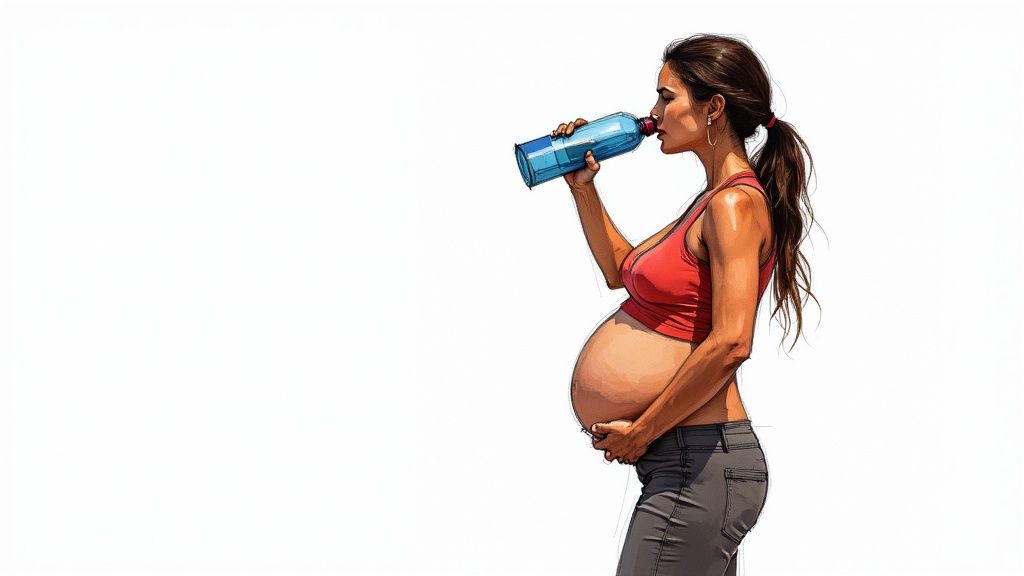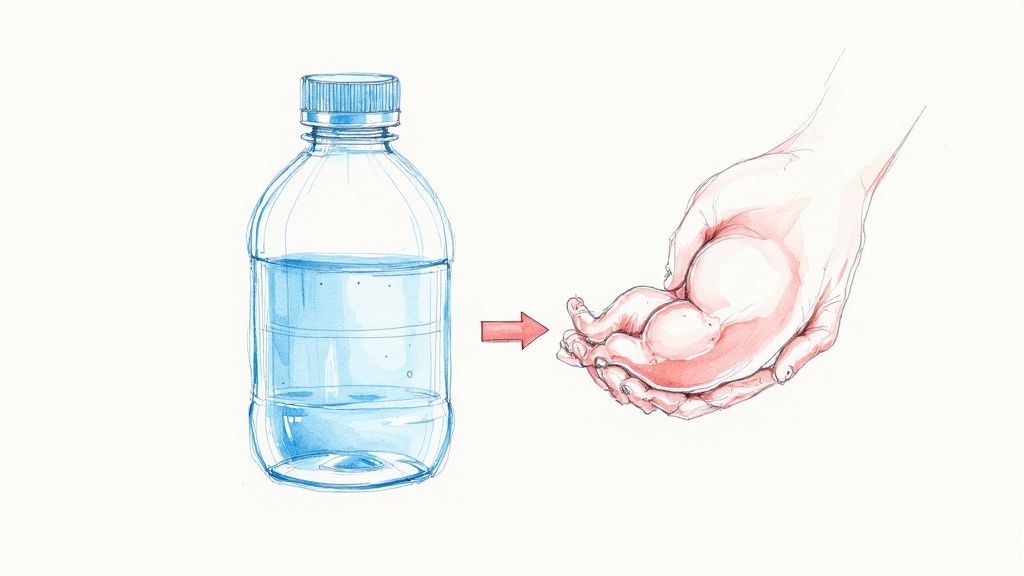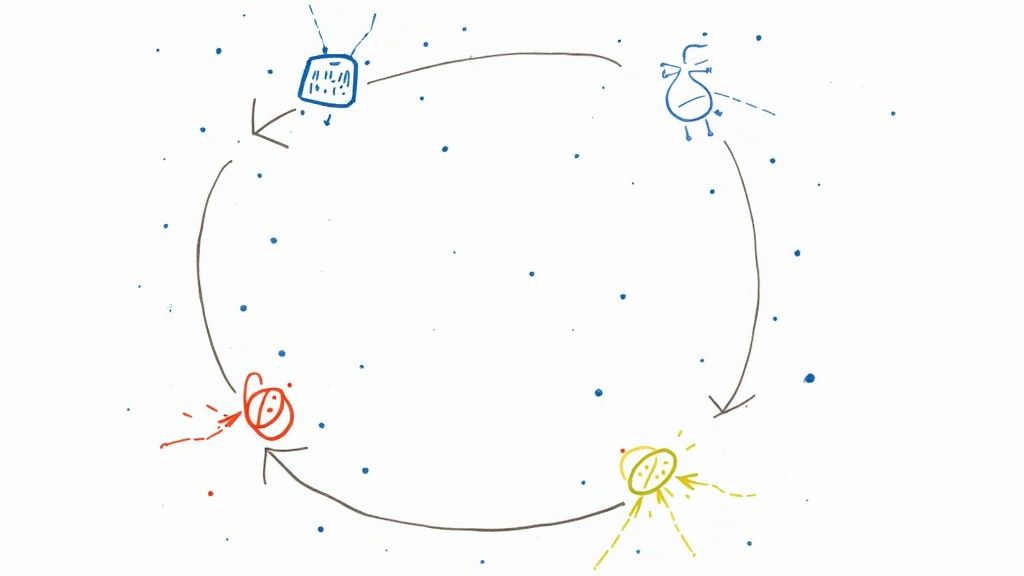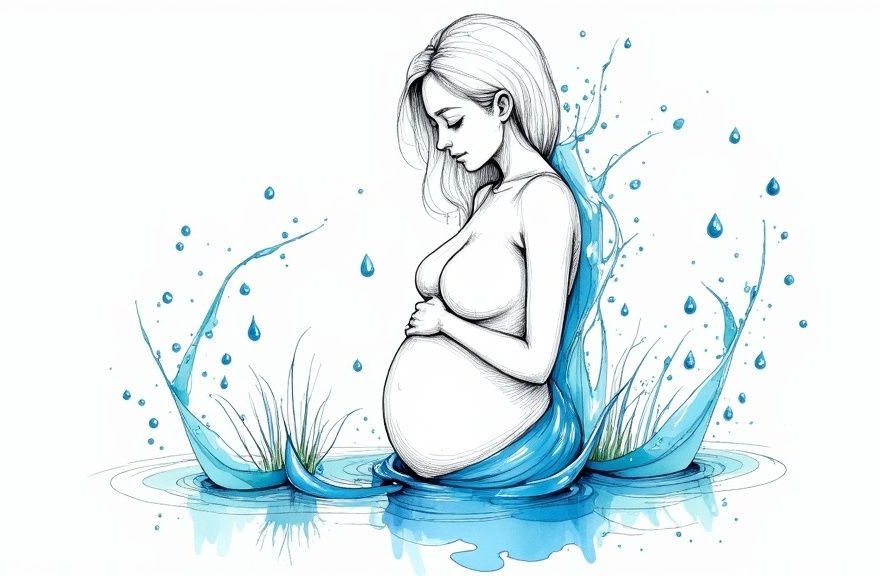Understanding Modern Pregnancy Hydration Needs

When you’re pregnant, proper hydration becomes more important than ever – but the common advice to “drink 8 glasses a day” only tells part of the story. Your body is working overtime to support your growing baby, with increased blood volume being one of the biggest changes. This extra blood, which is mostly water, helps deliver oxygen and nutrients to your developing little one. The amniotic fluid protecting your baby also depends heavily on you staying well-hydrated throughout pregnancy.
Why Traditional Hydration Advice Falls Short
While drinking eight glasses of water daily is a good starting point, this general recommendation doesn’t account for each woman’s unique needs during pregnancy. Your actual fluid requirements can vary quite a bit based on factors like how active you are, the weather, and your own body’s patterns. The Institute of Medicine suggests pregnant women need about 10 cups (2.4 liters) of fluids per day – but even this is just a general guide. Some women may need more or less depending on their specific situation, which is why paying attention to your body’s signals is so important.
The Impact of Dehydration on Pregnancy
Not getting enough fluids during pregnancy can lead to real problems. Research from Penn State has found that many pregnant women become dehydrated, especially during the middle and early third trimester. This can affect your baby’s birth weight, though many babies do catch up in growth later. A recent study in PLOS Digital Health showed that many pregnant women simply don’t know about or follow hydration guidelines. When you don’t drink enough water, it can lead to low amniotic fluid levels, which may affect how your baby develops. Just as a plant needs consistent watering to grow strong and healthy, your baby needs you to stay well-hydrated for proper development.
Practical Steps for Maintaining Optimal Hydration
Staying hydrated during pregnancy doesn’t need to be complicated. Keep a water bottle with you and take regular sips throughout your day. You can also get fluids from foods – try snacking on water-rich fruits and vegetables like watermelon, cucumbers, and spinach. To make drinking water more enjoyable, try adding fresh fruit slices or herbs to your glass. Remember that good hydration is an ongoing process – small, consistent efforts throughout the day are more effective than trying to catch up all at once. By making hydration a daily priority and adjusting your approach based on how you feel, you’re taking an important step toward a healthy pregnancy.
Navigating Trimester-Specific Hydration Challenges

Getting enough fluids during pregnancy is essential, but your hydration needs change significantly as your pregnancy progresses. Each trimester brings different challenges that affect how much and how often you need to drink. Let’s look at what to expect and how to stay properly hydrated during each stage of pregnancy.
The First Trimester: Managing Morning Sickness While Staying Hydrated
Morning sickness can make it really tough to drink enough water during early pregnancy. When you’re feeling nauseated, even small sips of water might seem impossible. Many moms find success with simple tricks like sucking on ice chips or taking tiny sips throughout the day instead of trying to drink full glasses at once. Eating water-rich foods like watermelon, cucumber, or citrus fruits can also help you stay hydrated when drinking plain water feels challenging. The key is finding what works for you and sticking with it.
The Second Trimester: Keeping Up With Growing Needs
Your body needs more fluids during the second trimester as your blood volume increases to support your growing baby and placenta. Most women need to drink more than the usual eight glasses of water per day during this time. This extra fluid helps deliver nutrients and oxygen to your baby while supporting healthy growth and development. If you’re not drinking enough, you might notice symptoms like headaches, fatigue, or dark urine – all signs that it’s time to increase your fluid intake.
The Third Trimester: Balancing Comfort and Necessity
The final months of pregnancy often mean frequent bathroom trips, which can make you hesitant to drink as much. But staying hydrated is especially important now, as proper fluid intake can help reduce swelling in your feet and ankles. It also helps prevent constipation, which is common in late pregnancy. While those extra bathroom visits might be annoying, they’re worth it for your and your baby’s health.
Tailoring Your Hydration Strategy to Each Trimester
Here are practical ways to meet your changing hydration needs:
- First Trimester: Try ginger tea, sparkling water, or sports drinks when plain water makes you queasy
- Second Trimester: Keep a water bottle with you and track your daily intake – aim for 10-12 glasses daily
- Third Trimester: Space out your fluid intake during the day and try to drink less in the evening to minimize nighttime bathroom trips
Remember that proper hydration looks different for everyone. Pay attention to your body’s signals and adjust your drinking habits as needed throughout your pregnancy. Just like your baby develops in stages, your hydration needs will change too – staying flexible and attentive to these changes will help ensure a healthy pregnancy.
The Hidden Benefits of Optimal Pregnancy Hydration
While most expectant mothers know that drinking enough water helps prevent constipation and maintain amniotic fluid, there are several important but less discussed benefits of staying well-hydrated during pregnancy. Learning about these additional advantages can help motivate moms-to-be to drink enough water throughout their pregnancy journey.
Hydration and Fetal Cognitive Development
Water plays a vital role in your baby’s brain development. When you drink enough fluids during pregnancy, you’re not just taking care of basic physical needs – you’re supporting your baby’s growing brain. Just like a garden needs consistent watering to produce healthy plants, your baby’s developing brain needs proper hydration to form neural connections and grow normally. This is especially important during the early weeks when the brain is rapidly developing.
The Role of Hydration in Labor and Delivery
Good hydration can make a big difference during labor and birth. When you’re well-hydrated going into labor, you’re more likely to have the energy needed for delivery and less likely to experience exhaustion from dehydration. For instance, drinking enough water helps maintain healthy blood volume, which ensures both you and your baby get plenty of oxygen during labor. Many women find that staying hydrated helps them feel stronger and more prepared for the work of giving birth.
Hydration’s Impact on Maternal Well-being
Drinking enough water benefits more than just your baby – it’s essential for your health during pregnancy too. Proper hydration helps your body regulate temperature, which is particularly helpful since pregnancy hormones can make you feel warmer than usual. Getting enough fluids also keeps your skin healthy and elastic as your belly grows, potentially reducing stretch marks. Taking care of yourself by staying hydrated directly benefits your growing baby as well.
Other Benefits of Optimal Hydration:
Drinking enough water throughout pregnancy offers several additional advantages that can make the experience more comfortable:
- Reduced Swelling: Regular hydration helps your body flush out extra sodium, which can decrease swelling in your hands, feet, and ankles
- Improved Digestion: Drinking enough water helps keep your digestive system working well and prevents constipation
- Increased Energy Levels: Being even slightly dehydrated can make you feel tired, so staying hydrated helps maintain your energy
- Healthier Skin: Getting enough fluids helps keep your skin clear and healthy during pregnancy
- Lower Risk of Urinary Tract Infections (UTIs): Good hydration helps clear bacteria from your urinary tract, reducing your chances of getting a UTI while pregnant
These less obvious benefits show why drinking enough water should be a key part of your pregnancy health routine. Just as a house needs a solid foundation, proper hydration creates the right environment for both mom and baby to stay healthy. Making hydration a daily priority is one of the simplest ways you can support your wellbeing and your baby’s development throughout pregnancy.
Mastering Early Warning Signs and Prevention

Staying hydrated during pregnancy is essential for both mom and baby’s health. While most pregnant women know they need to drink enough water, it’s not always easy to tell when dehydration is setting in. Many early signs can be subtle or confused with typical pregnancy symptoms, so it’s important to know what to look for.
Identifying Subtle Signs of Dehydration
Don’t wait until you feel thirsty – by then, you’re already mildly dehydrated. Watch for early signs like dark yellow urine, which is one of the clearest indicators that you need more fluids. You might also notice headaches that won’t go away, feeling more tired than usual, or having a dry, sticky mouth. These symptoms may seem minor but can impact how you feel throughout the day.
Differentiating Dehydration From Normal Pregnancy Symptoms
It can be tricky to tell if you’re dehydrated since pregnancy itself causes tiredness and nausea. The key is to look for multiple symptoms together. For example, if you’re extra tired and notice you’re not peeing as often as usual, plus your urine is darker than normal, dehydration is likely the cause. Knowing these patterns helps you take action when needed.
Practical Strategies for Prevention
The best approach is to prevent dehydration before it starts. Keep a water bottle with you and take small sips throughout the day rather than trying to drink large amounts at once. Think of it like caring for a plant – steady, frequent watering works better than occasional drenching. This helps your body absorb and use water more effectively.
Managing Hydration in Challenging Situations
Some situations make staying hydrated extra challenging during pregnancy. Air travel can be especially drying, so drink more water than usual when flying. During workouts, replace fluids lost through sweat to support your changing body. If you get sick with vomiting or diarrhea, you’ll need even more fluids to make up for the loss. Having a plan for these scenarios helps maintain good hydration.
When to Seek Medical Attention
While drinking more water usually helps mild dehydration, severe cases need immediate medical care. Call your doctor right away if you feel dizzy, lightheaded, or confused. These could be signs of serious dehydration that require treatment to protect both you and your baby’s health.
By paying attention to these warning signs and taking simple steps to stay hydrated, you can help ensure a healthy pregnancy. Making hydration a daily priority supports your wellbeing and your baby’s growth in important ways.
Building Your Personal Hydration Strategy

Proper hydration during pregnancy isn’t one-size-fits-all – you need an approach that fits your daily routines and personal needs. While general guidelines provide a good starting point, creating habits that work for you will help ensure you stay well-hydrated throughout your pregnancy journey. Let’s explore practical ways to develop a hydration plan you can stick with.
Combining Traditional Wisdom With Modern Tools
Your body gives you important signals about hydration through thirst and urine color – these natural cues remain essential guides. To make tracking easier, consider using a water tracking app on your phone to log your daily intake and spot patterns in your drinking habits. Many moms find that setting regular reminders, similar to taking prenatal vitamins, helps them stay on track. A marked water bottle can also provide helpful visual cues about your progress throughout the day. By paying attention to both your body’s signals and helpful tracking tools, you can better monitor and maintain healthy hydration.
Creative Ways to Increase Water Intake
While plain water is important, you have many enjoyable options for meeting your fluid needs. Mixing up your hydration sources can make drinking enough liquids feel less like a chore. Foods with high water content, like watermelon and cucumber, can contribute significantly to your daily intake while providing extra nutrients.
Here are some practical ideas to try:
- Infused Water: Mix in slices of cucumber, lemon, berries, or mint leaves to add natural flavor. Try different combinations until you find your favorites.
- Herbal Teas: Choose caffeine-free varieties for a warm, soothing drink. Ginger tea can help ease morning sickness too.
- Soups and Broths: Perfect for cold weather, these provide both hydration and nourishment.
- Smoothies: Blend fruits, vegetables, and dairy for a nutritious drink.
- Water-Rich Snacks: Keep easy options like grape clusters, orange segments, and celery sticks ready to grab.
Real Strategies From Successful Mothers
Many experienced moms have found effective ways to stay hydrated during pregnancy. Some make it a habit to drink a full glass of water first thing in the morning, before meals, and at bedtime. Others pair water breaks with regular activities, like drinking after each bathroom visit. Keeping a water bottle within reach at home, work, and in the car serves as a constant reminder to sip throughout the day. Try different approaches to find what fits naturally into your schedule.
Creating Sustainable Hydration Habits
Success with pregnancy hydration comes from building lasting habits rather than temporary fixes. Start with small, manageable changes and gradually increase your intake. Don’t worry if you miss your goal some days – just get back on track the next day. Think of good hydration as being just as important as your regular prenatal checkups. When you make it a normal part of your daily routine, staying hydrated becomes much easier to maintain throughout your pregnancy.
Overcoming Real-World Hydration Obstacles
Staying well-hydrated during pregnancy is essential for both you and your baby’s health, but daily life often throws unexpected challenges in the way of meeting your hydration goals. Whether you’re dealing with workplace restrictions, travel plans, or pregnancy-specific issues like frequent bathroom trips, these common obstacles can make it hard to drink enough water throughout the day. Let’s explore practical solutions to help you maintain good hydration habits, no matter what your day brings.
Workplace Hydration Hurdles and Solutions
The workplace can present some of the biggest challenges to staying hydrated during pregnancy. Teachers may have limited bathroom access between classes, while factory workers might face strict break schedules that make regular water breaks difficult. If you’re facing similar restrictions, start by having an honest conversation with your supervisor about your pregnancy needs. Many employers will work with you to find reasonable accommodations, such as allowing extra quick breaks or keeping a water bottle in your workspace. Consider bringing a large water bottle to minimize refill trips – this simple change can help you meet your daily water needs even with limited break times.
Travel and Hydration: Staying Hydrated on the Go
Travel brings its own set of hydration challenges, especially during pregnancy. Air travel can be particularly tricky – cabin air is very dry, and security restrictions limit the liquids you can bring through checkpoints. For air travel, bring an empty reusable water bottle to fill after security. Pack some hydrating snacks like fresh fruit or cucumber slices. During road trips, plan your route with regular rest stops in mind and keep a small cooler of water and healthy snacks within easy reach. A little preparation goes a long way in staying hydrated while traveling.
Managing Frequent Bathroom Trips
The constant need to use the bathroom is one of pregnancy’s most common complaints, and it can make some women hesitant to drink enough water. But drinking less isn’t the answer – proper hydration helps reduce swelling and can ease bladder pressure. To balance hydration with sleep quality, try front-loading your water intake earlier in the day. Drink most of your daily water before dinner time, and start tapering off 2-3 hours before bed. This timing adjustment can help you get better rest while still meeting your daily fluid needs.
Overcoming Taste Aversions and Nausea
Pregnancy can completely change how water tastes and morning sickness can make even small sips challenging. If plain water turns your stomach, try these simple alternatives: Add fresh fruit slices to your water, sip on caffeine-free herbal teas, or try natural coconut water. For severe nausea, start with small amounts – try sucking on ice chips or frozen fruit pieces throughout the day. The key is finding what works for you, even if that changes from week to week as your pregnancy progresses.
Staying hydrated during pregnancy doesn’t have to be overwhelming. You can overcome common obstacles and maintain healthy hydration habits with practical adjustments and creative solutions. Looking for more pregnancy support and guidance? Check out Pregnancy 101, a complete resource designed specifically for expectant Indian mothers.

